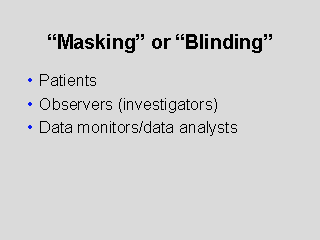 |
Masking, commonly referred to as "blinding," is a method of concealing
knowledge of treatment assignment as a means of reducing bias in reporting
or measuring outcome on the part of patients, those collecting the data, or
those analyzing study results. It has been demonstrated that when patients
or investigators know the treatment assignment (or even just when they think
they know it), they may introduce their own prejudices about the effect of
treatment into the assessment of outcome. If masking is successful, patients
and/or investigators will not know what treatment was assigned. In a
"single masked" study, usually the patient is masked with regard to
treatment; in a "double masked" study, the patient and the investigator are
masked; "triple masking" refers to the study in which the data monitors are
also unaware of treatment assignment (more controversial).
|
